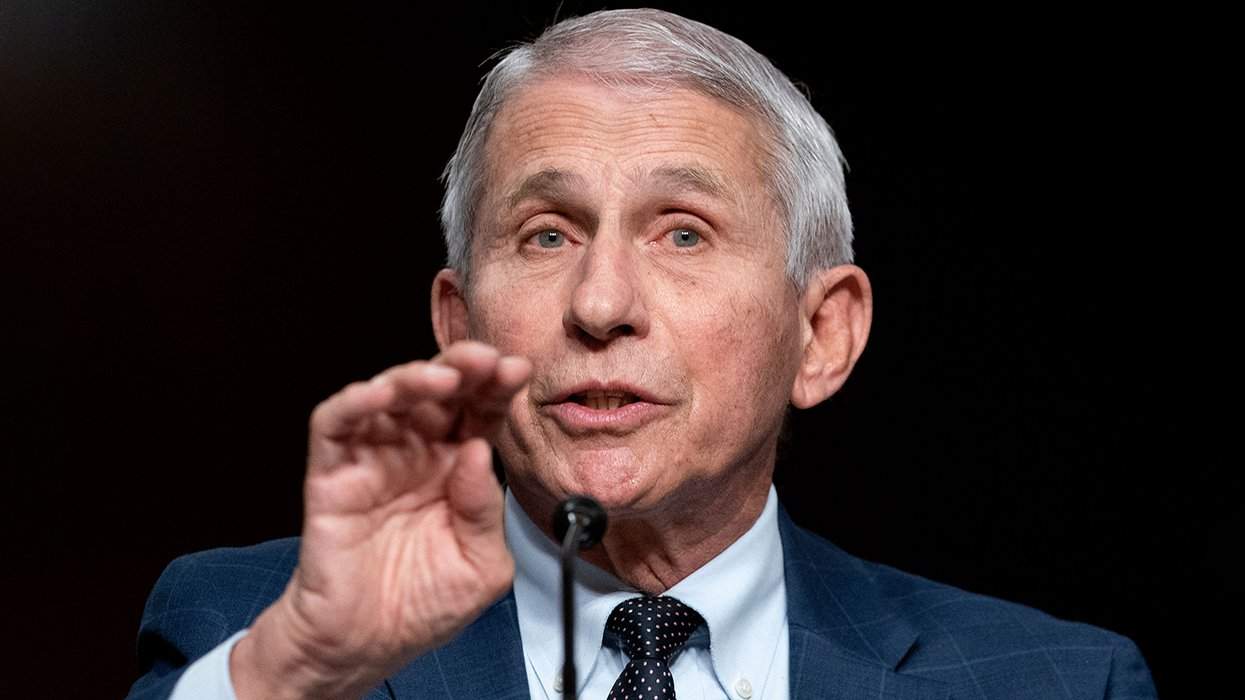In Dr. Anthony Fauci's view, we have come a long way since the first World AIDS Day 35 years ago in terms of implementing awareness and treatment tools to fight HIV and AIDS that make it eminently possible for us to end the outbreak by 2030.
However, he also sees that progress is threatened by the rise of the extreme right. “I’m very, very concerned about the resurgence of the anti-LGBTQ+ movement in this country,” Fauci warned in a recent interview. “It's reverting back to the way it was 40 years ago, which is terrible. We certainly have got to do something about that and push back against that.”
When I mentioned the latest news about Speaker Mike Johnson’s hate for the queer community by writing a foreword to a book that cruelly attacked gay people, and the fact that Republicans in Congress are seeking to strip funding for AIDS research and housing, and holding back reauthorization, after 20 years, of the President’s Emergency Plan for AIDS Relief (PEPFAR) – George W. Bush and Fauci's signature program. Fauci reacted strongly.
“We've got to go back to the old days, when we were very aggressive and proactive. We have got to shake the cages,” he said. “We have got to make sure that the extreme right in Congress realize they can't get away with what they are doing.”
One place to start is to look at what the gay community did back in the mid to late 1980s, Fauci says. “They organized. They were very vocal. We've got to get back to that. We can't let the insidious resurgence of anti-LGBTQ+ feelings in this country go without pushing back very aggressively against it. You know, when somebody like Johnson writes a foreword to a book that condemns the gay community, you should blast him in the media for doing that. You should blast him every single time something comes up where he’s attacking the community.”
I asked Fauci if it was time for another Larry Kramer, the founder of ACT UP, the foremost organization that fought for AIDS funding and recognition in the 1980s and '90s. “I think we need a bunch of Larry Kramers," he said. "We also need to tap experienced activists that are still around and are close friends of mine like Peter Staley, Mark Harrington, and Gregg Gonsalves. We've got to be very, very, very aggressive in pushing back on this nonsense.”
Fauci added that the extreme right’s intolerance and inaction on funding HIV and AIDS programs and research can surely affect the goal of a cure by 2030. “For us in the United States, when they decrease the funding and the ability to get money for the implementation of programs absolutely negatively impacts our goal. No doubt about it.”
“The whole idea about pushing back on science, the anti-science attitude of these people, the antigay attitude of people, it's as bad as I've ever seen it, and that really worries me. I mean, when you have legislators in the United States Congress unabashedly being antigay, that is just crazy.”
Fauci knows whereof he speaks. He was the keynote speaker at the White House Office of National AIDS Policy 35 dinner Thursday night. This year’s theme is "Remember and Commit."
“I told the audience that I'm in a unique position, given my age and my history, to have been there from the very first day of the outbreak, during those first weeks, months, and years," he said. "When we were in the dark years. We were really putting Band-Aids on hemorrhages, and it was very, very difficult for the patients, obviously, but also for me and my team. “
Fauci can never forget those days. “Remembering those days gets me to commit even more now. We have incredibly good therapy, incredibly good pre-exposure prophylaxis that are easy to administer, and easy to get people to be below detectable, U=U, and commit to implement what it takes to end the outbreak."
He returned to the U.S. Thursday from a trip to the Institut Pasteur, an internationally renowned center for biomedical research in Paris, where he was discussing some of the remarkable progress against HIV around the world.
“In the city of Amsterdam, the number of new cases last year were nine — nine in a city as big as Amsterdam. And in countries in southern Africa, Botswana, Eswatini, Rwanda, and Zimbabwe, they are already well on the way to end the outbreak," Fauci pointed out. "Now with countries in southern Africa and developed nations like the Netherlands and even Australia, if they can do it, we here in the U.S. sure as hell can do it too.”
However, one component preventing progress here in the U.S., says Fauci, is growing discrimination and vitriol against the disease and the queer community. When I asked Dr. Fauci if that meant someone like Sen. Rand Paul, who he used to spar with frequently, Fauci said yes. Did he miss those days of sparring with Paul? “It's tough to miss him because he's still coming after me every day," he said. "Those that discriminate, like Paul, are still out there on social media blasting me.”
Did Dr. Fauci still feel like the bogeyman of the extreme right?
“Are you kidding me? I'm public enemy number one, but what worries much more is how they are coming every day after the LGBTQ+ community, and we all need to be fighting back against that."





































































Charlie Kirk DID say stoning gay people was the 'perfect law' — and these other heinous quotes